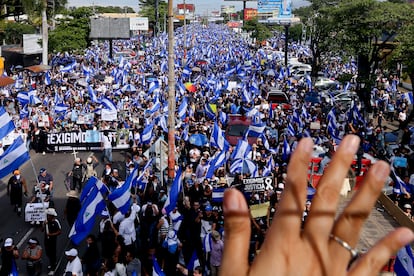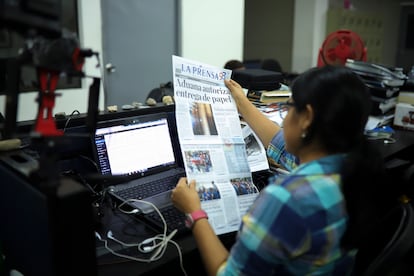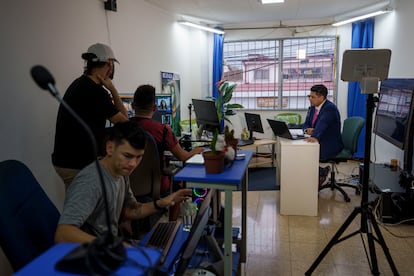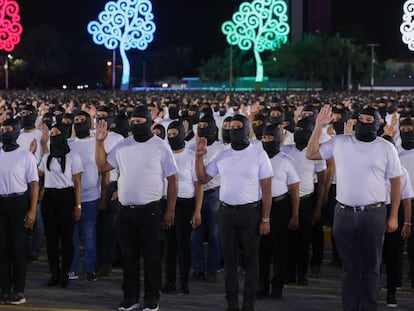Nicaraguan journalism (urgently) seeks allies to continue challenging the dictatorship
In the absence of effective institutions and checks and balances, journalists in Nicaragua have become a crucial pillar of support for institutions, the opposition, and civil organizations devastated by the repression of Ortega and Murillo

We have never had to juggle so many challenges to continue our reporting as we have in the past three months, ever since the Trump administration cut the U.S. cooperation funds that were vital for sustaining Divergentes. This is an independent media outlet from Nicaragua, based in exile due to the systematic repression of the dictatorship of Daniel Ortega and Rosario Murillo.
It’s not that we’re not used to juggling. When you investigate, report, and manage a critical media outlet under a totalitarian and crushing regime, journalists become a kind of juggler. We juggle emotional, economic, logistical, security, and self-censorship challenges. In other words, we keep publishing every single day while managing these fronts, which become even harder when you’re in exile.
Since 2018, the Ortega-Murillo regime (now “co-presidential”) has made Nicaraguan journalism one of its top enemies. Journalists were crucial in documenting the crimes against humanity committed during the social protests of that year (and those still being committed). While the Sandinista regime has dismantled the opposition in general — political parties, civil society organizations, critical business leaders, the Catholic Church, universities, doctors, culture (similar to the Cambodian dictator Pol Pot), and human rights organizations — it has not been able to eradicate the media.
The “co-presidential” couple continues to strike us where it hurts the most: it has murdered one journalist, who was imprisoned and disappeared, and exiled more than 280 reporters, editors, and media staff. It has criminalized the profession by confiscating newsrooms and private homes. It has stripped away nationalities, frozen bank accounts, persecuted and harassed our families; extinguished print newspapers (we are the only country in the Western Hemisphere without one), and recently blocked websites. But we have not remained silent and continue to grapple with the logistics of running a publication in such a hostile environment.

Before, when we were in Nicaragua, it was about dealing with the imminent threat of arrest, living on the run, hiding, moving from house to house, fearing what could happen to our families because of our work. We became pariahs, and our loved ones distanced themselves out of understandable terror. That takes an emotional toll. The ones you love leave or grow distant.
And for nearly five years now, we have resisted in exile with the added financial strain, as Costa Rica, where many of us are based, is an incredibly expensive country to eat and rent a place. We have suffered the growing precariousness of our profession and have been losing our country day by day — without passports and watching our family members die without being able to go to their funerals. Extraterritorial repression is a new weapon of the regime, and international cooperation has been key in navigating this landscape, which, to avoid further lengthening this article, is even more complex and only painted in general terms.
We must speak frankly, with sincerity, because, as our poet Rubén Darío said: “To be sincere is to be strong.” The usual juggling acts to sustain a media outlet have never been as complicated as they are now, following the fall in international cooperation, especially from the United States. Can you imagine what it means to maintain rigorous, investigative, and useful journalism — which by its nature is costly — while dealing with fewer and fewer available sources due to fear, which requires us to be even more meticulous in safeguarding their anonymity for their protection? What it means to produce content across multiple platforms, as we do at Divergentes, while simultaneously trying to figure out how to get a journalist — harassed by the police while receiving cancer treatment — out of Nicaragua through “blind spots”? What it means to bring that journalist to Costa Rica and find ways to secure their chemotherapy while we work on registering them in the Costa Rican social security system? We are exiled journalists without social guarantees. This happened to us, and it continues to happen.
In recent weeks, with great pain, we’ve had to part ways with talented reporters and contributors. It’s a tough blow because bringing them back will be an uphill battle — there is no next generation waiting in the wings. Few are willing to take on this dangerous profession in Nicaragua anymore. We’ve made cuts here and there, trying to stretch our operations for as long as possible. And that’s just our newsroom. Across the board, countless colleagues have left journalism due to funding cuts, turning to Uber, working in butcher shops, or taking on other jobs just to support themselves and their families — many with young children.
It’s not just the journalists who lose; all of Nicaraguan society does. The region does. Even the United States. We are losing voices grounded in journalistic method — megaphones that are invaluable in exposing authoritarian regimes and corrupt satrapies, whose consequences, starting with migration, ripple far beyond our borders.

One of the main arguments for shutting down USAID is that the funds granted “do not serve the interests” of the United States. We strongly disagree with this because, based on our field experience and our reporting, we can confirm with evidence in hand that we are key to the hemisphere for several reasons that combine geopolitics, migration, regional stability, democracy, and human rights.
In the absence of institutions and effective checks and balances, journalists in Nicaragua have become a pillar of support for the institutions, opposition, and civil organizations devastated by the Ortega-Murillo repression. We give them a voice and national and international reach. There is no shortage of examples: We investigate and report on how Nicaraguans cannot freely practice their faith. We delve into Ortega and Murillo’s ties with actors antagonistic to Washington, such as Russia, China, and Iran. We explain how the ruling couple instrumentalizes — and profits from — migration to blackmail the United States. We expose the Sandinista regime’s drug policy, which, oddly, has seized more cash than cocaine in recent years. And we uncover how corrupt officials facilitate money laundering, paving the way for illicit funds to reach Miami, other U.S. cities, and Europe.
But above all, we strive to defend the Western values and principles we believe in: democracy — with all its complexities — freedoms, institutions, and, in bold letters, the protection of human rights. We have an unwavering commitment to the victims of crimes against humanity. These are values that, judging by history, should concern us all — from here, in the narrow waist of the Americas, to the United States and Europe.
But more than just the cuts to USAID assistance, the new Trump administration has validated the stigmatization pushed by Ortega-Murillo, Nicolás Maduro in Venezuela, and the Castros in Cuba against journalism — branding us as “Washington-paid mercenaries” or claiming we have “enriched ourselves” with cooperation funds, when in reality, we account for every dollar received. Just as our work is public, our resource management is entirely auditable. If these dictators’ accusations were true, our colleagues wouldn’t be driving for Uber or desperately seeking ways to migrate to the United States or Europe.
This is something colleagues from Cuba and Venezuela had already been warning about, but now it’s being said outright: by abandoning independent media, the Republican administration is giving these three dictatorships what they had failed to achieve for decades — silencing journalists. And U.S. Secretary of State Marco Rubio knows this well — or if he doesn’t, let us inform him: In Managua, for example, the government funds mobile billboards that relentlessly push the narrative that we are “thieves, corrupt, and sold out to the empire.” Beyond just international aid, this is a battle between freedom and authoritarianism — between democracy and totalitarianism.
Despite this, journalism always endures. At Divergentes, we believe that abject regimes and these stifling visions of freedom come and go, but journalism remains. In that sense, from our newsroom, we are finding ways to keep moving forward. It is impossible to monetize traditionally in Nicaragua, in other words, to sell advertisements, especially when these tyrants trample over businesses that dare to advertise. There is no market to charge subscriptions to audiences that live on the brink of poverty, prioritizing bread, cheese, and beans.
So, at Divergentes, we have launched a campaign to urgently seek allies so that we can continue denouncing and reporting in this hostile context. We are no longer just a journalism in resistance, but one that must reinvent itself to adapt to new forms of information consumption, as well as to current realities, where the sources of international cooperation that sustained much of our operations are dwindling and misinformation is rampant.
Our campaign also seeks to reach a Europe struggling with its own pressing challenges, such as the invasion of Ukraine. The Atlantic dividing Central America and Europe has never seemed wider, especially with this race to rearm in the face of the latent threat of Putin. However, European leaders should not forget this region because journalists, as we noted before, are key to understanding what is happening in these parts of the world — issues that, in the medium term, also affect their countries, such as migration and the respect for human rights, a shared principle that does not tolerate blackmail or negotiation.
The campaign “Be an ally to the truth,” we insist, is not about selling news, but about raising funds. It aims to strengthen the connection with our audience and build a community committed to the right to information, in Nicaragua, Central America, the United States, and Europe. The challenge is necessary and shared.
Sign up for our weekly newsletter to get more English-language news coverage from EL PAÍS USA Edition
Tu suscripción se está usando en otro dispositivo
¿Quieres añadir otro usuario a tu suscripción?
Si continúas leyendo en este dispositivo, no se podrá leer en el otro.
FlechaTu suscripción se está usando en otro dispositivo y solo puedes acceder a EL PAÍS desde un dispositivo a la vez.
Si quieres compartir tu cuenta, cambia tu suscripción a la modalidad Premium, así podrás añadir otro usuario. Cada uno accederá con su propia cuenta de email, lo que os permitirá personalizar vuestra experiencia en EL PAÍS.
¿Tienes una suscripción de empresa? Accede aquí para contratar más cuentas.
En el caso de no saber quién está usando tu cuenta, te recomendamos cambiar tu contraseña aquí.
Si decides continuar compartiendo tu cuenta, este mensaje se mostrará en tu dispositivo y en el de la otra persona que está usando tu cuenta de forma indefinida, afectando a tu experiencia de lectura. Puedes consultar aquí los términos y condiciones de la suscripción digital.

